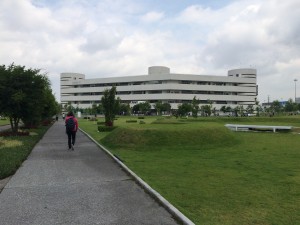Reflection Week 1:
I was placed in Puebla, the 4th largest city in Mexico. It is located about an hour and a half south east of Mexico City. The university is called Tecnológico de Monterrey. They have 32 campuses located all across Mexico. The high school is a private school and it is located within the University Campus in Puebla. I am staying in the residence hall about 10 minutes away from campus by bus. The campus is only 11 years old and so the buildings are quite new. It costs about $4,000 US a semester for the high school students to attend. Therefore, the area is quite wealthy and posh. The campus is beautiful; they even have an organic coffee bar called Blue Elephant in their cafeteria. The classrooms themselves are equipped with a white board and a projector with a clicker. All of the students have cell phones and laptops. The classrooms do not have desks. They each contain about 40 colourful rolling chairs with an attached arm for their laptops. They are like a new version of the old chairs with desks attached.
I have been placed with Debbie, a teacher who is currently solely teaching classes in Ethics and Citizenship. The students are presenting their final projects on social problems. For their projects, they had to choose a social issue, explain why it is important to them, why it is a social issue and then implement a solution to the problem. I have been observing the presentations and helping grade their assignments, although the presentations are in Spanish and I do my best to follow along, as I am not fluent in Spanish. Tomorrow is Labour Day and therefore there are no classes in session. Next week, I will be continuing to assess their assignments and presentations. I will also be teaching a couple of classes in Ethics and Citizenship. Due to the language barrier, I will be keeping most of my teaching activity based and expanding on what they have already been learning.
Over this week, I have had a chance to compare the teaching experience in Canada to the one in Mexico, although due to the nature of the school I don’t believe this is a valid representation of schooling in Mexico. I have asked whether it would be possible for me to visit a public school for a day. The class sizes go up to 38 students, and classroom management is mostly lost with this many students. Unfortunately, I haven’t had a chance to see much teaching because they have been presenting their projects but learning seems to be more the responsibility of the student than in Canada. Students are required to take more ownership of their learning. I enjoy the subject area. I think there is a lack of education or discussion about ethics in our high schools. It is especially important for students who come from such privilege. The school has about 900 students, but somehow manages to have a vibrant school culture. When we walk through the hallways everyone says hello and asks who I am. I think that is essential and admirable in a school. I hope to one-day work in a positive environment like this one. That being said, the politics of education are still visible.
Reflection Week 2:
The project I have focused on to date is learning, planning and implementing lessons on Ethics, to test the students’ knowledge and learning over the term. In my BA I majored in Sociology, which touches often on the grey matters of ethics and morals. I believe that these topics are under valued in schools in Canada. I am impressed with the high school here that offers a variety of REQUIRED courses that bring students closer to their world and have them test, challenge and question their personal beliefs and ideologies. In Canadian education, at the secondary level, we lack the practical, tangible knowledge that is necessary to become an educated citizen who contributes to society on a variety of levels. This, in essence, is part of the reason I chose to be a teacher and is a big part of my teaching philosophy.
I believe too much emphasis is put on academics in our society and not enough on the diversity of skills and the importance of communities and contribution to society. In Tec de Monterrey, even with approximately 900 students the communities seem to be strong and the relationships between peers and teachers seems to go past academic education. It is not solely about the ability to complete a test but about the value of what the students have learned and how it co aligns with their lives and their world.
This learning is valuable for students, teachers and society because it promotes meaningful learning about life and society. Specifically in the ethics class, I was teaching a lesson called the ‘lifeboat lesson’, where students were given a scenario where their boat was sinking and they could only save half of the people on the boat. It tested the students learning throughout the semester by having them differentiate between ethics and morals and decide whether their own personal morals aligned with societies ethics. I then had them compare this to our world and the major social problems they had been discussing through the semester. They came up with problems like wealth distribution, poverty, homelessness, globalization, environment, sustainability and corruption. We discussed how this lifeboat scenario was related to all of these world problems. The learning was especially meaningful to these students because they attend the most expensive private school in Mexico and therefore come from wealthy families, who as we pointed out, have a lot of control over societal outcomes.
Thus far, I have learned that children are capable of taking on responsibility of their own learning (if it is a requirement) and that this, in itself, should be part of the skills that are learned through high school. I have solidified that I want my practice to be based on practical learning and relationships. These relationships should be based on a consistency of expectations, consequences and support. I have also learned that there is just as much value in learning through informal education as formal. Some examples of this are the building of social skills, the management of emotions and the management of time. These skills are not taught formally but are learnt informally through the students experience in school.
Reflection Week 3:
Through my Community Field Experience in Puebla, I have discovered that I have confidence in front of any class as a teacher, even if there are barriers or I am not completely comfortable with the material. This was shown when I was put out of my comfort zone and asked to teach an ethics class in Spanish. Although my Spanish is not fluent, I managed to overcome the language barrier, teach a valuable lesson and keep the students engaged. I have also improved my ability to ask questions and use wait time effectively to permit student thought, inquiry and reflection. I found that wait time was also functional in Mexico and aided in classroom management, with the students monitoring each other to maintain the attention of the class.
I found another one of my strengths is creating student relationships. I believe this is due to my confidence in front of the class and openness to be honest and to learn about the students and to allow them to learn about me. I strongly agree with the idea that students learn more from teachers with whom they have built a relationship. I can see this in my SA, Debbie, as well. She has the ability to build relationships with all of her students, even though she has 6 classes of approximately 35-40 students each semester. She maintains an open door policy in her office and the students come to visit her often. This is a part of my teaching philosophy and I hope to always be able to build positive, constructive relationships with my students, regardless of the conditions.
My lessons were mostly activity based, using the skills the students have built over the semester to deconstruct a problem and connect it to the real world. I think the students responded well to the activity. It was beneficial for them to see a diversity of opinions and to build an understanding of the individuality of ethics and morals. It is important for students to recognize that it is difficult to come to an agreement on what is ethical or moral and to learn that their opinion is not the only one that is valid. The diversity of opinions showed through in the class and they developed and changed through class discussion and strategically posed questions.
The curriculum and this lesson will be useful in my future teaching because it is very practical and grounding for the students. I personally believe the material is extremely valuable. A version of this course should be a requirement in Canadian education, but since it is not, when I have the pleasure of teaching a family studies or a planning class (both of which I really want!) I would like to create a version of this course into a unit based on ethics, morals and politics. This can be taught through a family studies lens or a planning lens and may have a variety of outcomes based on the students and the material. The interesting part of the course is that it has the ability to produce completely different outcomes based on the students in the course, their social location, their personal beliefs and values, their culture etc. Each student enters the class with a set of beliefs and the course helps students to express, share, challenge and argue their ideas. With the right classroom environment the course has the ability to thrive.



